#saterland
Explore tagged Tumblr posts
Link
#Schuhkartonaktion#Helping Hands#Lathen#Markus Vähning#Schuhkarton#Weihnachten#Verein#Spende#Vereinsspende#schuhplus#Vereinsförderung#c-Port#Saterland#Sedelsberg#schuhplus Saterland#Georg Mahn
0 notes
Text
Dear means 'valued; precious; beloved'. However, in certain expressions it also means 'expensive', such as in to cost dear. This meaning, inherited from Proto-Germanic, became dominant in cognates of dear, such as Dutch duur, German teuer, and Swedish dyr. The infographic tells you the whole story.
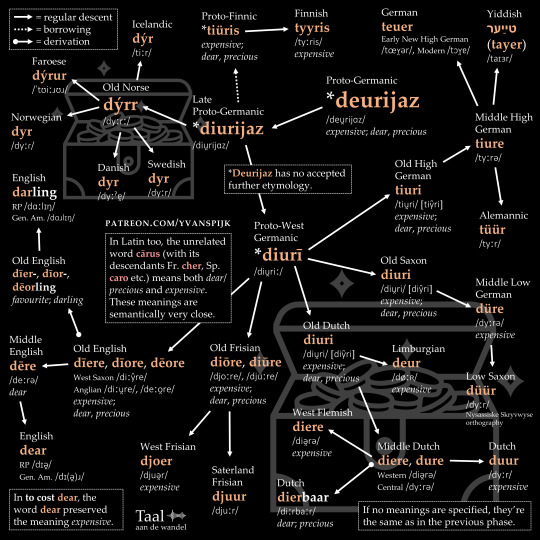
#historical linguistics#linguistics#language#etymology#english#dutch#german#low saxon#frisian#old frisian#old saxon#old high german#old english#old dutch#middle high german#middle dutch#middle english#middle low german#lingblr#proto-germanic#proto-west germanic#yiddish#west flemish#limburgian#saterland frisian#faroese#icelandic#norwegian#swedish#danish
176 notes
·
View notes
Text
Deutschribing Germany
Languages
Most languages native to Germany belong to the Germanic family, but some of them are Slavic languages. German is the official language, with over 95% of the country speaking Standard German or one of its dialects as their first language.
There are six recognized minority languages: Danish, Lower Sorbian, North Frisian, Romani, Saterland Frisian, and Upper Sorbian. The main immigrant languages spoken are Arabic, Dutch, Greek, Italian, Kurdish, Polish, Russian, Serbo-Croatian, Tamil, Turkish, and Ukrainian.
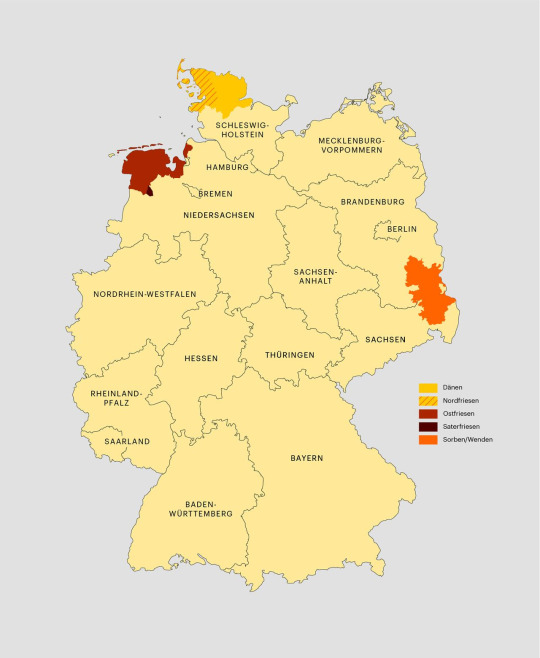
German (Deutsch)
German belongs to the West Germanic group of languages and is the native language of 95 million people. It is the official language in Austria, Belgium, Germany, Liechtenstein, Luxembourg, and Switzerland, as well as South Tyrol in Italy, and is a recognized minority language in ten countries from four different continents.
German Standard German is the standardized variety of German spoken in Germany. Its pronunciation is similar to the German spoken in Hanover. Its alphabet has 30 letters: a b c d e f g h i j k l m n o p q r s t u v w x y z ä ö ü ß. Most German vocabulary is of Germanic origin, but around one fifth was taken from French or Latin. German dialects and varieties are explained in detail in this post.
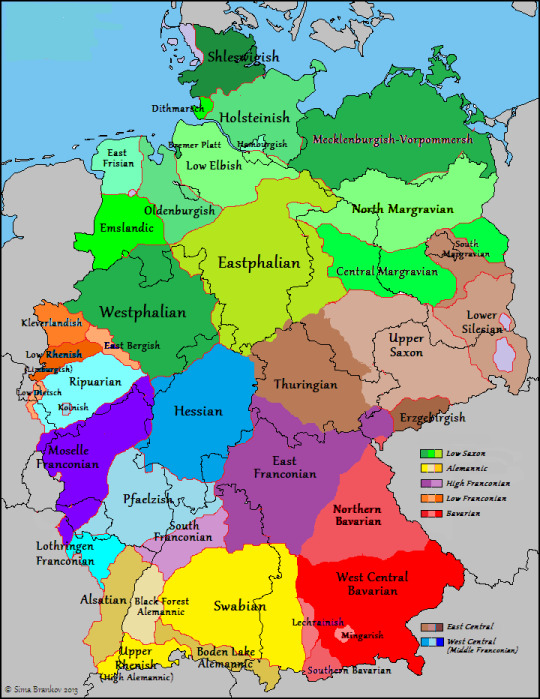
Romani (rromani ćhib)
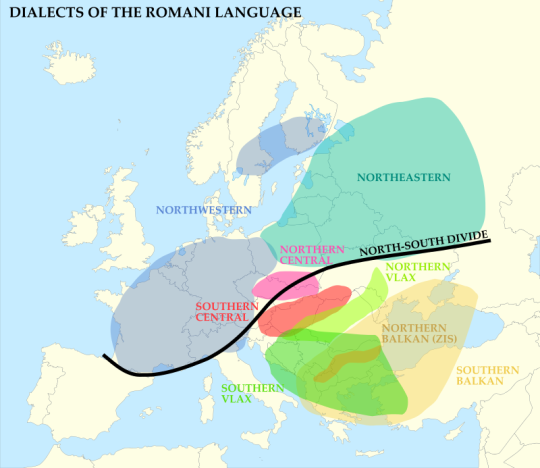
Sinte Romani (sintitikes) is the variety of Romani spoken in Germany and neighboring countries. It belongs to the Northwestern Romani dialect group, which in turn is part of the Indo-Iranian branch of the Indo-European family. It is spoken by around 195,000 people and is not mutually intelligible with other Romani varieties.
There is no standard pronunciation or grammar. The alphabet has 31 letters: a b c č čh d dž e f g h i j k kh l m n o p ph r s š t th u v x z ž.
Danish (dansk)
Danish is a North Germanic language with 6 million native speakers. It is the official language of Denmark and the Faroe Islands and a recognized minority language in Schleswig-Holstein and Greenland.
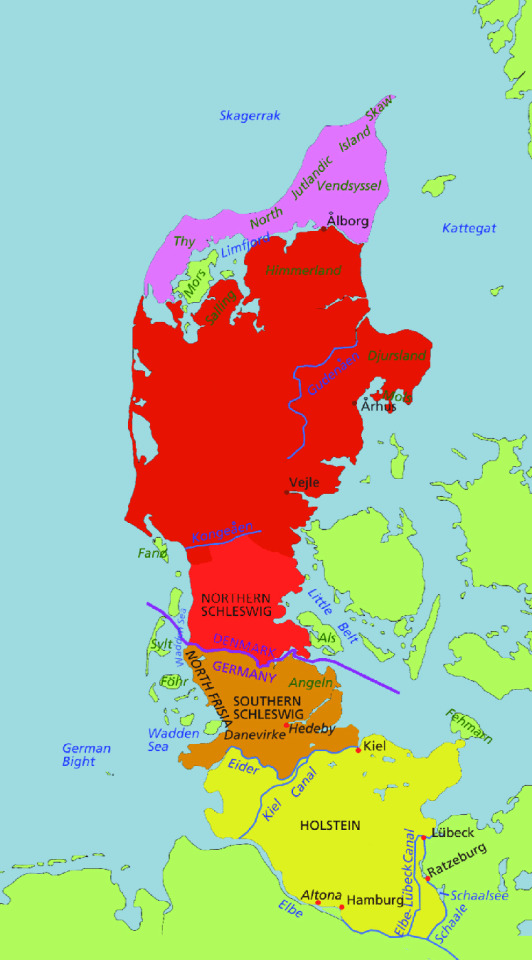
The Danish alphabet has 29 letters, including the 26 found in the English one and æ, ø, and å.
Upper Sorbian (hornjoserbšćina)
Upper Sorbian (Obersorbische Dialekte in the map) belongs to the West Slavic branch and is recognized as a minority language in Saxony, where its 13,000 native speakers live.
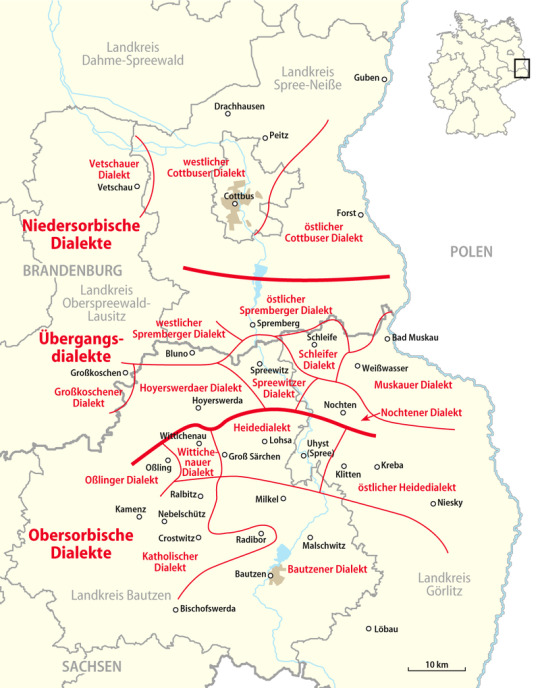
Its alphabet has 34 letters: a b c č ć d dź e ě f g h ch i j k ł l m n ń o ó p r ř s š t u w y z ž.
North Frisian (Nordfriisk)
North Frisian is part of the West Germanic branch and is spoken natively by 10,000 people in Schleswig-Holstein. It comprises 10 dialects, which are divided into two groups: insular and mainland.
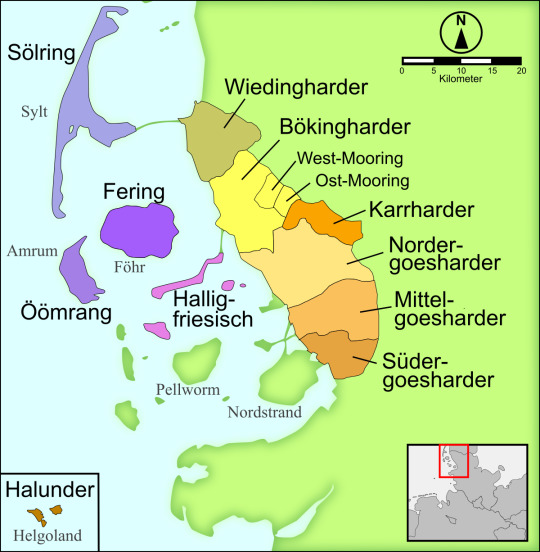
Its phonology and orthography vary depending on the dialect, but there are 32 basic letters: a ä å b ch d dj đ/ð e f g h i j k l lj m n ng nj o ö p r s sch t tj u ü w.
Lower Sorbian (dolnoserbšćina)
Lower Sorbian (Niedersorbische Dialekte in the map of Sorbian dialects) is a West Slavic language spoken natively by 6,900 people in Brandenburg.
It uses the same letters as Upper Sorbian but adds ś and ź and uses ŕ instead of ř, bringing the total number of letters to 36.
Saterland Frisian (Seeltersk)
Saterland Frisian belongs to the West Germanic branch and is recognized as a minority language in Lower Saxony. It is spoken by 2,200 people and has three fully mutually intelligible dialects.
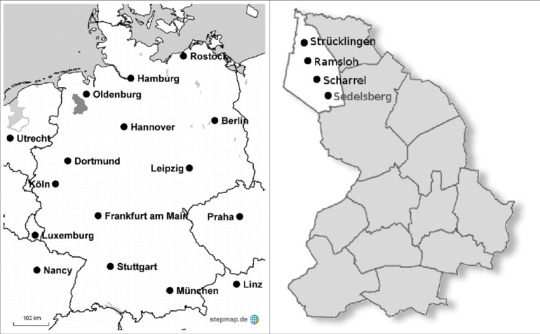
Its orthography has not been standardized yet, but there are 31 common letters: a ä b ch d e f g h i ie j k/kk ks kw l m n ng o oa ö p r s sch t u ü v w.
Here is Article 1 of the Universal Declaration of Human Rights in the native languages of Germany:
German: Alle Menschen sind frei und gleich an Würde und Rechten geboren. Sie sind mit Vernunft und Gewissen begabt und sollen einander im Geist der Brüderlichkeit begegnen.
Romani: Sa e manušikane strukture bijandžona tromane thaj jekhutne ko digniteti thaj capipa. Von si baxtarde em barvale gndaja thaj godžaja thaj trubun jekh avereja te kherjakeren ko vodži pralipaja.
Danish: Alle mennesker er født frie og lige i værdighed og rettigheder. De er udstyret med fornuft og samvittighed, og de bør handle mod hverandre i en broderskabets ånd.
Upper Sorbian: Wšitcy čłowjekojo su wot naroda swobodni a su jenacy po dostojnosći a prawach. Woni su z rozumom a swědomjom wobdarjeni a maja mjezsobu w duchu bratrowstwa wobchadźeć.
North Frisian: Ali Mensken sen frii, likwērtig en me disalev Rochten bēren. Ja haa Forstant en Giweeten mefingen en skul arküđer üs Bröđern öntöögentreer. (Sylt/Sölring dialect)
Lower Sorbian: Wšykne lu��e su lichotne roźone a jadnake po dostojnosći a pšawach. Woni maju rozym a wědobnosć a maju ze sobu w duchu bratšojstwa wobchadaś.
Saterland Frisian: Aal do Moanskene sunt fräi un gliek in Wöide un Gjuchte gebooren. Joo hääbe Fernunft un Gewieten meekriegen un schällen sik eenuur as Bruure ferhoolde. (Ramsloh dialect)
Translation: All human beings are born free and equal in dignity and rights. They are endowed with reason and conscience and should act towards one another in a spirit of brotherhood.
5 notes
·
View notes
Text

Fun fact: "Touden" is a "thorn" in Saterland Frisian
#they don't have a canon ethnicity aside from being “northern”#but it's cool to know#dungeon meshi#laios touden#falin touden#dungeon meshi meta#maybe it's a common knowledge but i just found out#maybe that's why they were also thordens?
19 notes
·
View notes
Text
X-Men and Cultural Appropriation
I pretty much pointed out how the X-Men writers have indulged in cultural appropriation to varying degrees, in the sense that the mutants are stand-ins for ethnic minorities but most of them don’t speak minority languages. Mind you, minority languages are minority because they’re not commonly spoken due to being stigmatised and discouraged. People would get whacked if they spoke in such a language, whilst this never really happened in the X-Men stories as far as I remember. It doesn’t help when at least most X-Men writers either don’t speak any minority language or bother learning it, which would explain the ironically appropriative air X-Men stories give off.
Like they co-opt minority experiences but almost none of the writers are either into minority cultures nor are they minorities themselves, this is likely why both Sean and Theresa Cassidy fit Irish stereotypes but neither of them speak Irish. It wouldn’t hurt if Rahne Sinclair actually spoke Scots instead of weird butchered English she sometimes she’s slotted into, I don’t think there are any mutants who speak Venetian, Lombard/Milanese, Low German and Saterland Frisian either. Again this involves a greater admiration for something this marginalised as a minority language of any given country than is commonly shown and done in X-Men comics, honestly I got into Irish because of loving Irish foik music.
So there is a difference between cultural appreciation and cultural appropriation, the former involves actually loving and respecting the culture in question and the other makes a mockery out of it when borrowed though sometimes they are blurred together. (Trust me, it’s like that with me when it comes to China until recently.) The X-Men stories and their respective writers frequently fall into the latter, especially when it comes to non-American and/or nonwhite mutants. This is likely why as I said before, both Cassidys are Irish stereotypes who neither speak Irish to any degree.
It’s kind of tragic when you realise how there is a difference between reiterating ethnic stereotypes and having any real appreciation for/interest in certain cultures, this may not always be the case but it seems in my case my interest in Ireland stemmed from learning Irish from Irish folk music. I don’t think X-Men stories ever lead me to loving foreign cultures the way I did with Irish folk music, so it becomes really evident that X-Men writers have co-opted the experiences of minorities for their characters and stories but show no real interest in those people themselves.
It’s not just that Siryn and her father are Irish stereotypes (or at least started out as such), but how the other mutants don’t speak any minority language which would’ve furthered the minority comparison more. There aren’t any mutants who speak Lombard, Venetian, Breton, Welsh, Frisian, Low German, Sicilian, Sardinian, Scots, Scottish Gaelic, Kurdish and Nahuatl, maybe until recently, despite X-Men writers’ tendency to harp on mutants as the ultimate minority, the minority of all minorities within Marvel stories. You might say that they’re obscure and irrelevant, but they are important markers of social identity to some people.
If I were to compare X-Men to any one of the Milestone stories (Icon and Blood Syndicate), the latter two are written by members of actual minorities so there’s going to be an authenticity that most X-Men stories lack. If X-Men writers and stories alike reveal an insincerity in showing the (ethnic) minority perspective, this could partly explain why not a lot of mutants speak minority languages. This may not always be the case, but it is telling how this aspect of social identity gets missed out. If X-Men stories are inadequate and untrustworthy when it comes to the minority language, perhaps something else does.
One that even outdoes X-Men when it comes to portraying ethnic/linguistic minorities at all, especially when written by actual minorities and/or those who speak minority languages.
#irish language#ireland#x-men#marvel#marvel comics#minority language#minority languages#cultural appropriation#siryn#theresa cassidy#sean cassidy#milestone comics#scots#scots language#rahne sinclair
4 notes
·
View notes
Text
luck
From Middle English luk, lukke, related to Old Frisian luk (“luck”), West Frisian gelok (“luck”), Saterland Frisian Gluk (“luck”), Dutch geluk (“luck, happiness”), Low German luk (“luck”), German Glück (“luck, good fortune, happiness”), Danish lykke (“luck”), Swedish lycka (“luck”), Icelandic lukka (“luck”). According to the OED, it may be related to lock.
Loaned into English in the 15th century (probably as a gambling term) from Middle Dutch luc, a shortened form of gheluc (“good fortune”), whence Modern Dutch geluk. Middle Dutch luc, gheluc is paralleled by Middle High German lücke, gelücke (modern German Glück). The word occurs only from the 12th century, apparently first in Rhine Frankish. Perhaps from a Frankish *galukki. The word enters standard Middle High German during the 13th century, and spreads to English and Scandinavian in the Late Middle Ages. Its origin seems to have been regional or dialectal, and there were competing German words such as gevelle or schick, or the Latinate fortūne from Latin fortūna. Its etymology is unknown, although there are numerous proposals as to its derivations from a number of roots.
3 notes
·
View notes
Text
Start von SEO-Crashkurs für die Werbepartner der 🐮"Trude Kuh" Vereinsförderung

⏰ Start der SEO-Crashkurse heute am ⚓ c-Port Saterland für die Werbepartner der 🐮"Trude Kuh" Vereinsförderung 🥳 MEGA 🥳 www.seo-crashkurs.de
0 notes
Text
wilderness
From Middle English wildernes, wildernesse (“uninhabited, uncultivated, or wild territory; desolate land; desert; (figuratively) depopulated or devastated place; state of devastation or ruin; human experience and life”) [and other forms],[1] and then either:
from Middle English wilderne (“deserted or uninhabited place, wilderness; land not yet settled”) [and other forms] (from Old English wilddeōren (“savage, wild”); see below)[2] + -nes, -nesse (suffix forming abstract nouns denoting qualities or states);[3] or
from Old English *wildēornes, *wilddēornes, probably from wilddēor (“wild animal”) [and other forms] or more likely from wilddēoren (“savage, wild”) (from wilddēor + -en (suffix forming adjectives with the sense ‘consisting of; material made of’)) + -nes (suffix forming abstract nouns denoting qualities or states).[4]
Wilddēor is derived from wilde (“savage, wild”) (ultimately either from Proto-Indo-European *wel-, *welw- (“hair, wool; ear of corn, grass; forest”), or *gʷʰel- (“wild”)) + dēor (“beast, wild animal”) (ultimately from Proto-Indo-European *dʰwes- (“to breathe; breath; soul, spirit; creature”)).
The English word is cognate with Danish vildnis (“wilderness”),
German Wildernis, Wildnis (“wilderness”),
MiddleDutch wildernisse (“wilderness”)
(modern Dutch wildernis (“wilderness”)),
Middle Low German wildernisse (“wilderness”)
(German Low German Wildernis (“wilderness”)),
Saterland Frisian Wüüldernis (“wilderness”),
West Frisian wyldernis (“wilderness”).
Sense 3.3 (“situation of disfavour or lack of recognition”) is a reference to Numbers 14:32–33 in the Bible (King James Version; spelling modernized): “But as for you, your carcasses, they shall fall in this wilderness. And your children shall wander in the wilderness forty years, and bear your whoredoms, until your carcasses be wasted in the wilderness.”
0 notes
Text
0 notes
Text
"Hot Week" bei schuhplus - 20% auf Schuhe in Übergrößen

Große Damenschuhe sowie große Herrenschuhe im Sparformat: 20% Rabatt auf große Schuhe bei schuhplus Von großen Sneakern bis große High Heels: Die große schuhplus-Welt großer Möglichkeiten Es wird heiß bei schuhplus! Unter dem Motto "Hot Week" lädt Europas größtes Versandhaus für Schuhe in Übergrößen alle Modebewussten dazu ein, den Sommer mit einem frischen Paar XL-Schuhe zu krönen. Bis zum 31. August bietet der Übergrößen-Spezialist aus Niedersachsen satte 20% Rabatt auf das gesamte Sortiment an Übergrößen-Schuhen. Dies ist die ideale Gelegenheit, um modische Highlights zu entdecken und dabei bares Geld zu sparen. Einfach den Gutscheincode "Hot-Week" im Warenkorb eingeben und schon reduziert sich der Gesamtbetrag automatisch um zwanzig Prozent. Von großen Sneakern bis große High Heels: Eine große Welt großer Möglichkeiten Das Sortiment von SchuhXL-Spezialist schuhplus ist so vielfältig wie die Wünsche der Kundinnen und Kunden. Für Damen stehen elegante High Heels in Übergrößen bereit, die jedes Outfit auf ein neues Level heben. Ob für eine glamouröse Abendveranstaltung, eine Hochzeit oder ein romantisches Dinner - mit den edlen Modellen von schuhplus sind Frauen mit Damenschuhe in Übergrößen (https://www.schuhplus.com/damenschuhe) immer bestens gekleidet. Für den täglichen Komfort bietet schuhplus wir eine breite Auswahl an XL-Ballerinas und XL-Slippern, die stilvoll und gleichzeitig bequem sind. Perfekt für einen Stadtbummel, den Büroalltag oder einfach für den täglichen Einsatz. Auch sportlich Aktive kommen in der "Hot Week" voll auf ihre Kosten. Lässige große Sneakers und sportive Laufschuhe in Übergrößen sorgen nicht nur für den richtigen Halt, sondern auch für den coolen Look, der sowohl beim Workout als auch in der Freizeit überzeugt. Für Outdoor-Enthusiasten hält schuhplus aus Dörverden robuste Wander- und Trekkingschuhe bereit, die optimalen Schutz und höchsten Tragekomfort bieten - ob auf anspruchsvollen Trails oder bei entspannenden Spaziergängen in der Natur. Herren mit großen Füßen finden ebenfalls ein umfassendes Angebot an Herrenschuhe in Übergrößen (https://www.schuhplus.com/herrenschuhe). Business-Schuhe in klassischen Designs, die sowohl im Meeting als auch beim Business-Dinner eine gute Figur machen, gehören ebenso zum Repertoire wie bequeme Freizeit- und große Sportschuhe, die sich durch hohe Qualität und modische Akzente auszeichnen. Für festliche Anlässe und besondere Events bietet der Schuhe Plus Spezialist edle Schnürer und elegante Halbschuhe, die das perfekte Finish für jeden Anzug sind. Beste Qualität und große Schuhe mit 20% Rabatt "Wir bei schuhplus wissen, dass die Suche nach stilvollen Schuhen in Übergrößen eine Herausforderung sein kann. Daher legen wir großen Wert auf ein vielfältiges Angebot, das unserer Kundschaft die Auswahl erleichtert", sagt Geschäftsführer Kay Zimmer. "Mit der "Hot Week" möchten wir unseren Kundinnen und Kunden nicht nur modische Highlights bieten, sondern auch einen attraktiven Preisvorteil. Die 20% Rabatt auf unser gesamtes Sortiment machen den Schuhkauf bei schuhplus noch lohnenswerter." Das umfangreiche Sortiment umfasst Damenschuhe ab Größe 42 sowie Herrenschuhe ab Größe 46. Dabei setzt schuhplus auf renommierte Marken wie Skechers, Gabor, Josef Seibel oder Adidas, die für höchste Qualität und modische Aktualität stehen. Alle Modelle sind sowohl im Onlineshop unter als auch in den schuhplus-Filialen erhältlich. Warum jetzt zuschlagen? Die "Hot Week" ist die perfekte Gelegenheit, um hochwertige große Schuhe (https://www.schuhplus.com) für jeden Anlass zu einem reduzierten Preis zu erwerben. Der Rabatt von 20% gilt auf alle Schuhe in Übergrößen, egal ob elegant, sportlich oder casual. Damit bietet schuhplus die ideale Möglichkeit, die Sommergarderobe zu erweitern oder sich schon jetzt auf die kommende Herbstsaison vorzubereiten. Zudem ermöglicht die Vielfalt des Angebots es jedem Kunden, den perfekten Schuh für seine individuellen Bedürfnisse zu finden - sei es für den Alltag, für besondere Anlässe oder für sportliche Aktivitäten. Mit dem aktuellen Rabatt ist dies besonders attraktiv, da sich die Preise durch den Nachlass von 20% deutlich reduzieren und so zusätzliche Einsparungen möglich werden. Kunden können die "Hot Week"-Angebote sowohl im Onlineshop von schuhplus als auch in den Filialen in Dörverden sowie in Sedelsberg am c-Port Saterland nutzen. Der benutzerfreundliche Onlineshop bietet eine komfortable und sichere Bestellmöglichkeit, bei der die Wunschmodelle mit wenigen Klicks direkt nach Hause geliefert werden. Die Bildrechte liegen bei dem Verfasser der Mitteilung.
#schuhplus#gutschein#coupon#rabatt#sparpreis#gutscheincode#sparcode#SSV#SALE#sparen#rabattgutschein#große schuhe#große damenschuhe#große herrenschuhe#schuhe in übergrößen#dörverden#saterland#c-port
0 notes
Text
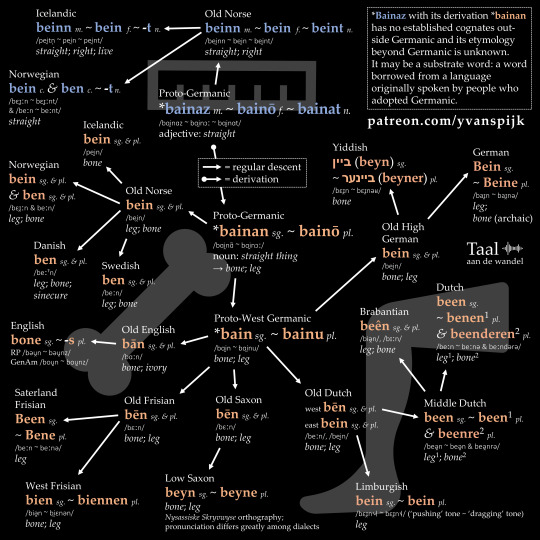
Bone & Bein
The word bone has the same origin as German Bein, Dutch been, and Swedish ben, which mean both 'bone' and 'leg'. These nouns are thought to stem from an adjective meaning 'straight'. It lives on in Icelandic beinn and Norwegian be(i)n 'straight; right'.
#historical linguistics#linguistics#language#etymology#english#dutch#german#old english#old dutch#old high german#old saxon#low saxon#old frisian#west frisian#old norse#norwegian#danish#swedish#lingblr#catalan#limburgish#brabantian#yiddish#saterland frisian
57 notes
·
View notes
Text
From Middle English newes, newys (“new things”), equivalent to new (noun) + -s. Compare Saterland Frisian Näis (“news”), East Frisian näjs ("news"), West Frisian nijs (“news”), Dutch nieuws (“news”), German Low German Neeis (“new things; news”), though unlike the English word, these originated as genitives, not plurals. Sometimes erroneously claimed to be an acronym of "North, East, West, South" or "Noteworthy Events, Weather, Sports".
"i was today years old when I learned [the most blatantly untrue folk etymology you've ever heard]!!"
13K notes
·
View notes